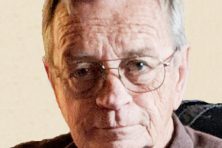Spirit of Sydney Harris
- Share
- Tweet
- Pin
- Share
This past week I had occasion to remember the columnist Sydney Harris. Harris wrote for the Chicago Tribune and later the Chicago Sun Times, and I was an avid reader of his columns. He owned a home in Fish Creek, which I was once invited to during John Anderson’s run for President in 1980 – an honor I still appreciate.
Periodically, Harris would write columns that he titled “Things I Learned While Looking Up Other Things,” which – as you may have guessed – were filled with interesting trivia. I often reflect, when I think of these columns, how much fun Harris would have had if he had lived long enough to experience the Internet.
In the spirit of Sydney Harris, and in particular, his columns that I refer to above, I offer the following two tidbits that I ran across recently.
The first tidbit begins in 1956 when a psychologist named George A. Miller published an article in The Psychological Review (vol. 63, pp. 81-97) entitled, “The Magical Number Seven, Plus or Minus Two: Some Limits on Our Capacity for Processing Information.” The gist of Miller’s article is that people generally cannot store more than approximately seven pieces of unrelated information in their short-term memory without finding some way to relate them.
Thus, in 1958, when today’s norm of seven digit phone numbers was introduced in Wichita Falls, KS the choice of seven numbers was anything but arbitrary. The phone company was completely aware of Miller’s research. They knew that, based on Miller’s Law, when the nephew called directory assistance to get Aunt Edwina’s phone number, the likelihood of the nephew remembering the phone number long enough to dial it correctly was extremely high.
Miller’s Law, however, poses distinct problems for today’s number glutted world. According to Henry Roediger, chairman of the psychology department at Washington University in St. Louis, “Every additional number you have to dial before you get to the seven digits increases the error rate. It’s called the response prefix effect. Even if you just have to start with a ‘9’ or a ‘1,’ it drives up the errors across all seven digits.”
One way to circumvent this problem is through a memory technique called “chunking,” which involves breaking down a string of symbols into parts that can be stored in memory as though they were one symbol. In essence, “chunking” is similar to speed-reading, which involves recognizing whole blocks of words simultaneously rather than each word, individually and, once again, the phone company tried to take advantage of “chunking” when they devised our system of phone numbers.
Just as the phone company recognized Miller’s Law when they chose seven digits as our basic phone number, they also attempted to embed chunking in the numbers by separating the first three numbers with a hyphen. And though I didn’t find any documentation to this effect, I would hazard the guess that the concept of chunking also resulted in our Social Security numbers being separated into a block sequence of 3 – 2 – 4.
According to Miller’s article, the phone company did error in their attempt to chunk our phone numbers. “Unfortunately, for reasons no one understand,” he writes, “memory is helped more when the first chunk consists of four digits.” This phenomena was not discovered until several years after the current numbering system was in place and even if the phone company had been aware of this they probably wouldn’t have varied their scheme: the early automated switching machines handled a three digit prefix better than four.
So what’s the deal with the number seven? Miller concludes his article with this observation:
“And finally, what about the magical number seven? What about the seven wonders of the world, the seven seas, the seven deadly sins, the seven daughters of Atlas in the Pleiades, the seven ages of man, the seven levels of hell, the seven primary colors, the seven notes of a musical scale, and the seven days of the week? What about the seven-point rating scale, the seven categories for absolute judgment, the seven objects in the span of attention, the seven digits in the span of immediate memory? For the present I propose to withhold judgment. Perhaps there is something deep and profound behind all these sevens, something just calling out for us to discover it. But I suspect that it is only a pernicious, Pythagorean coincidence.”
I think it is probably safe to assert that unbeknownst to most of us, there is a group of people out there who are members of the American Dialect Society. This group has been around since 1889, but in 1990 they began voting on “words of the year.” In the year 2000, they met in Chicago to not only choose the word of the year (Y2K), but to choose the word of the decade (Web), and the word of the century (Jazz).
Two of their members have gone so far as to select a word or phrase for each year of the century. The criteria for selection is that the word or phrase had to reflect the spirit of the time and that ideally have or had lasting meaning. Words/phrases from the past include barbershop (1910), jeep (1940), and yuppie (1984).
Obviously, when this highbrow (1903) group assembles, normalcy (1920) is at a premium, and nary a case of athlete’s foot (1928) will be found. While some may term them geeks (1978), or passengers from a UFO (1953) because of their language IQ (1916), these characterizations are unfair. While they may not qualify as role models (1957), and the acronym (1943) for their group, ADS, is rather passé, certainly this doesn’t mean their work suffers from a credibility gap (1966).
So just out of curiosity, I decided to check some important dates in my life to see what words this austere group had chosen. For my high school graduation in 1976 they chose couch potato; for my college graduation in 1979 they chose stealth; and for my daughter Molly’s birth in 1989 they chose virtual reality.
Sensing a rather disturbing trend I looked for the word chosen to characterize our language in the year I was born…and my worst fears were confirmed: for the year 1958 the American Dialect Society chose Murphy’s Law.


